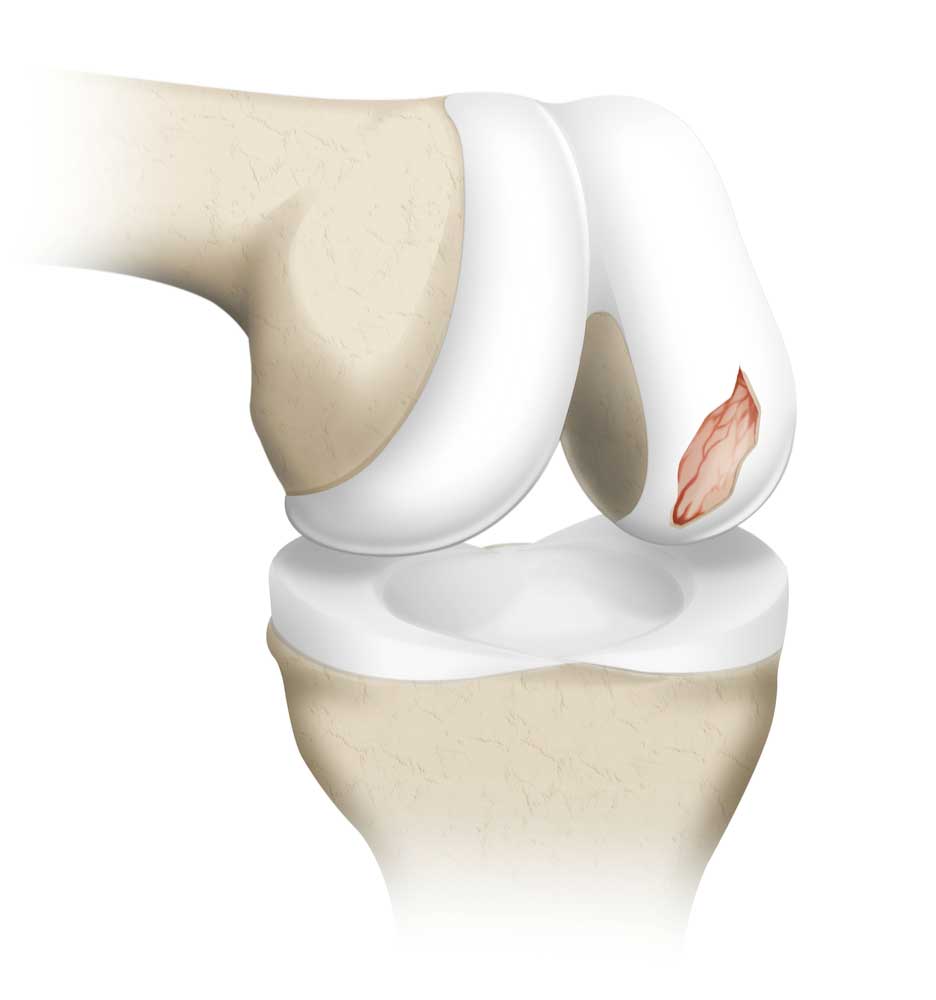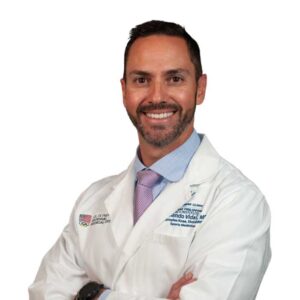What is a Focal Articular Cartilage Defect?
Articular cartilage is the tough, smooth white tissue that covers the ends of the bones where they come together to form joints. It is one of the most highly specialized tissues in the human body and facilitates almost frictionless movement of your joints. In fact, the coefficient of friction between 2 cartilage surfaces is smoother than ice on ice!
Unfortunately, as a consequence of its highly specialized nature, it has lost the ability to heal and as such, articular cartilage has very limited intrinsic healing capacity.
A focal articular cartilage defect means there is damage to one specific area of the cartilage. A focal defect in the knee refers to an area of cartilage that was injured and has caused damage to what was once a normal joint surface. A focal articular cartilage defect can lead to knee pain, swelling and dysfunction. Dr. Armando Vidal is a nationally recognized expert in the management of cartilage injuries. Cartilage restoration is his passion. He has extensively studied and published on these injuries and has vast clinical experience in treating patients who have focal articular cartilage defects of the knee.
These injuries are complex and require a comprehensive approach for success. Dr. Vidal and his colleagues at the Steadman Clinic in Vail have the most extensive experience managing these injuries for patients in the Vail, Aspen and the surrounding Denver, Colorado communities. For these particular injuries, having a provider who examines the knee holistically and has experience with concomitant procedures such as osteotomy, meniscal transplantation and a variety of cartilage repair strategies is key.

What causes a defect in articular cartilage?
Focal articular cartilage damage can be caused by many different things including:
- Trauma: A direct blow to the knee in sporting events such as football, basketball. Automobile accident or other traumatic injuries can damage articular cartilage.
- Loss of blood supply to the joint resulting in a breakdown of bone and cartilage (osteochondritis dissecans).
- Malalignment of the bones, causing an uneven load distribution which can wear away articular cartilage.
- Acute or chronic joint instability caused by a previous injury such as a dislocation or ligament tear.
- Wear-and-tear: Where the cartilage wears away, leaving the bone exposed.
- Lack of movement: Long periods of inactivity or immobility can cause damage to the cartilage.
What are the symptoms of a focal cartilage defect?
Individuals who have damage to the articular cartilage may experience some of the following symptoms:
- Swelling, either with or without activity (can sometimes be the only symptom)
- Pain in the knee
- Soreness or a dull ache
- Stiffness in the knee joint and decreased range of motion
- Popping or clicking of the knee
- Grinding or grating sensation
How is a focal articular cartilage defect diagnosed?
Some focal articular cartilage defects can be difficult to diagnose. Often, patients who have these defects can have a relatively normal exam. For patients in Vail, Aspen and the surrounding Denver, Colorado communities, Dr. Vidal will use an X-ray, MRI imaging and sometimes an arthroscopic examination to help determine the presence and extent of cartilage damage.
How is a cartilage defect repaired?
It is important to assess the exact location of the focal articular cartilage defect and what the underlying causes are. Articular cartilage changes on the lower portion of the femur (where the patella rests) are generally, easier to treat than the area where the femur and tibia meet. The size of articular cartilage legions is also an important treatment factor.
Non-Surgical Treatments:
Not all focal articular cartilage defects require surgery. Dr. Vidal prefers a conservative approach which includes observation, RICE (rest, ice, compression, elevation), bracing, physical therapy and biologic treatments (PRP and Stem Cell).
Surgical Treatments:
Due to the highly technical and individualized nature of focal articular cartilage defect repair, it is important to seek the advice of Dr. Vidal who has had extensive, successful experience in treating cartilage defects, tears and damage.
There is not a “one size fits all” treatment when it comes to a cartilage repair. Dr. Vidal will consider several different factors including the size and location of the defect, as well as the overall status of the joint. He will also discuss the current symptoms, long term goals of the patient, and their willingness to commit to the necessary postoperative rehabilitation. Some of the treatments Dr. Vidal may use include:
- Chondroplasty – Dr. Vidal debrides (trims away) the damaged area of cartilage. This treatment smooths out the area and helps to reduce pain, swelling and mechanical symptoms. Frequently, chondroplasty serves as the first step in a more complicated cartilage treatment.
- Augmented Microfracture – This treatment is best described by comparing it to road treatment for potholes. Used when the cartilage damage in the knee appears to be gouged out or have a divot, microfracture surgery fills in the “pothole”
- Allograft (OATs) – Osteochondral allograft transfer (often referred to as allograft OATs) is often called the “gold standard” for cartilage repair. In an allograft OATs procedure, a plug of living, viable cartilage and bone is harvested from a donor to repair a focal chondral lesion. The donor tissue is size-matched to an individual patient and surgically prepared to precisely reconstruct a lesion.
- Matrix Associated Chondrocyte Implantation (MACI) – is a two-stage procedure where a biopsy of healthy cartilage is first removed from the knee (during the chondroplasty step) and cultured in a specialized lab in Boston. These cultured autologous (your own) chondrocytes are then embedded on a specialized collagen membrane and used to patch an area of cartilage damage.
(For more information and detail on these surgical treatments, please click on the procedure listed.)
Focal Articular Cartilage Specialist
Articular cartilage is a specialized type of tissue that allows for the smooth movement of bones. Injuries to the cartilage are very common and can be caused by participating in many different sports or activities. If you believe you have experienced an injury to the articular cartilage, you must see an expert. Cartilage specialist, Doctor Armando Vidal has years of experience providing diagnosis for patients in Vail, Aspen, and the surrounding Denver, Colorado communities who are experiencing a cartilage defect. Contact Dr. Vidal’s team today!

Locations
180 S Frontage Rd W
Vail, CO 81657
226 Lusher Court
Ste 101
Frisco, CO 80443
322 Beard Creek Road
Edwards, CO 81632


